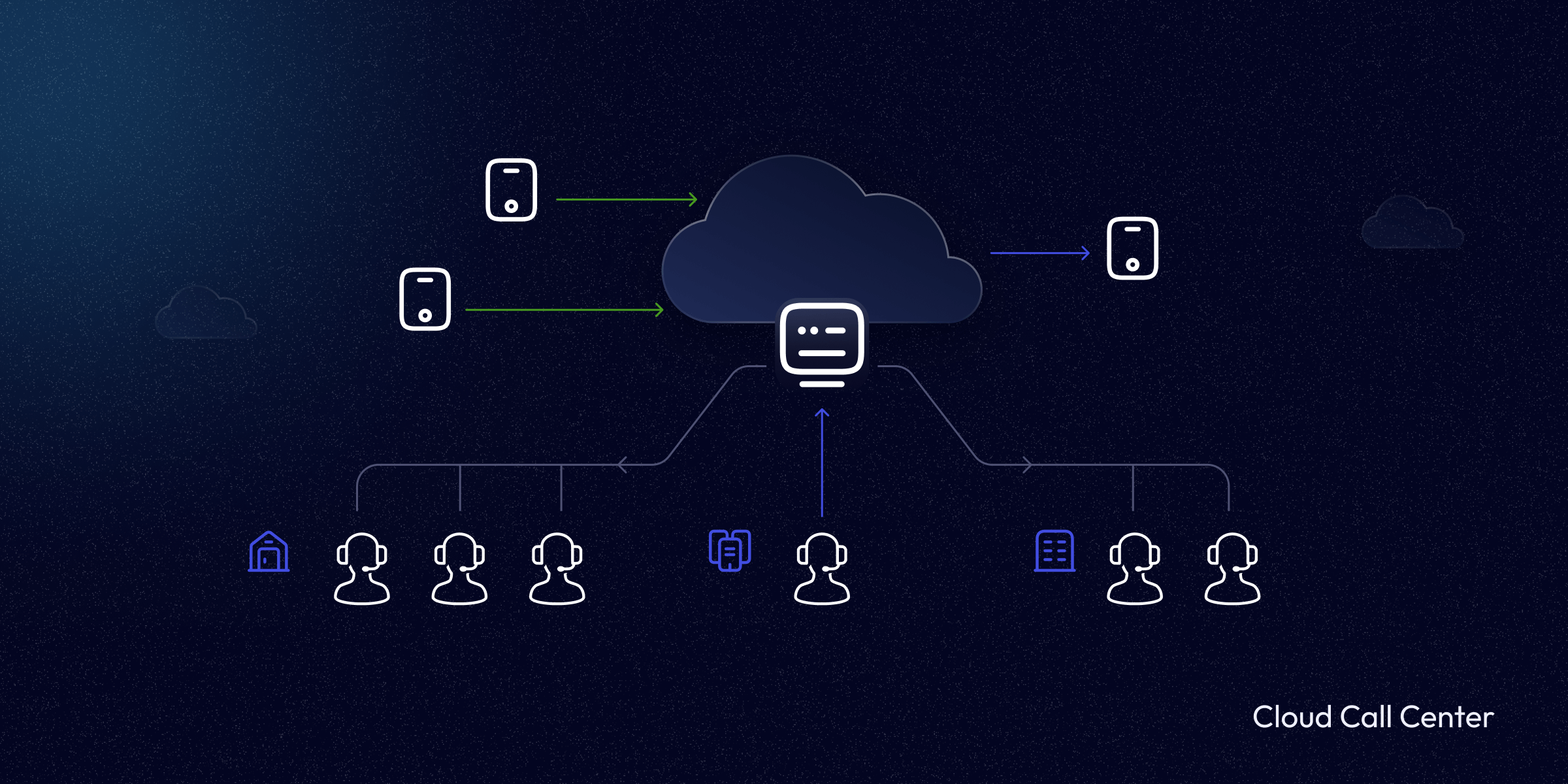A Guide to Cloud Contact Centres – Benefits, Features & a Lot More
- July 4th, 2024 / 5 Mins read
-
gogul saravanan

A Guide to Cloud Contact Centres – Benefits, Features & a Lot More
- July 4th, 2024 / 5 Mins read
-
gogul saravanan
In today’s fast-paced and ever-changing business environment, outstanding customer service is more crucial than ever. With the rise of digital customer communication channels and an ever-increasingly demanding client base, traditional on-premise contact centres can no longer meet modern company needs. Traditional on-premise contact centres confront some obstacles, including high initial hardware and software costs, extensive maintenance, restricted scalability, and difficulty integrating new technology. Furthermore, these centres are susceptible to local interruptions and require ample IT resources to handle security and updates. According to markets and markets, the cloud-based contact centre market is projected to grow from USD 26.2 billion in 2024 to USD 86.4 billion by 2029.

Cloud-based infrastructure changes contact centres by providing flexibility and scalability, allowing businesses to adjust resources to meet demand swiftly. It saves money with a pay-as-you-go strategy and removes the need for costly on-site hardware. Cloud solutions also improve functionality by seamlessly integrating with advanced technology such as artificial intelligence, omnichannel assistance, and analytics. They provide comprehensive security and reliability through automatic upgrades and disaster recovery solutions. Cloud-based contact centres are more efficient, agile, and provide a better customer experience than traditional ones.
What is a Cloud Contact Centre?
A cloud contact centre is a virtual solution that handles customer and employee contacts over several media. In addition to taking incoming and outbound calls, contact centre personnel handle communications via email, chat, messaging, and social media. The appropriate cloud contact centre software combines client conversations and context across channels and platforms, allowing your team to provide the best possible customer support. At the same time, agents must be ensured they have all the required tools.
How Does a Cloud Contact Centre Work?
Omnichannel Routing:
Incoming queries are automatically sent to the most suitable agent based on call nature, agent abilities, and availability. This leads to faster resolution and a better customer experience.
Cloud Infrastructure:
The service provider handles all hardware, software, and maintenance, relieving your IT team of these responsibilities.
Real-time Analytics:
Provides valuable information on call volume, agent performance, and customer mood. Customer data helps identify improvement opportunities and optimise overall contact centre operations.
Call Recording and Monitoring:
Allows supervisors to track calls for training and quality assurance objectives.
Interactive Voice Response (IVR):
Difference Between Traditional On-Premise Contact Centres and Cloud Contact Centres
The primary distinction between an on-premise and a cloud contact centre is the location and management of technical infrastructure.
An on-premise contact centre is deployed and runs on the customer’s servers in their facility. This means that the company manages and maintains the technology, software, and infrastructure needed to operate the contact centre. This also implies that the company must invest in the appropriate gear, software, and personnel to run the contact centre and pay for upgrades and maintenance.
A cloud contact centre, on the other hand, is hosted and maintained by a third-party supplier using remote servers. The third-party provider is in charge of overseeing and maintaining the technology infrastructure. This means the company can invest in something other than gear, software, or personnel to run the contact centre. End users are also not liable for the expenditures connected with upgrades and maintenance.
Feature | On-Premise Contact Centre | Cloud Contact Center |
Deployment | On-site hardware and software | Hosted on third-party servers |
Scalability | Hardware-dependent, limited | Easily scalable with demand |
Maintenance | In-house IT team required | Managed by service provider |
Flexibility | Less flexible | Highly flexible and adaptable |
Disaster Recovery | Complex and costly | Often included and streamlined |
Remote Work | Challenging | Supported easily |
Benefits of Cloud Contact Centre
Cloud contact centres have numerous benefits. Here are the primary benefits that firms may look forward to:
1. Scalability
The cloud contact centre solutions are highly adaptive to changing company requirements. They can scale up or down based on call volume, seasonal demand, or unexpected business development. This flexibility enables businesses to avoid over-provisioning hardware and software, which is common in traditional on-premises arrangements and assures optimal resource usage.
2. Cost Efficiency
Cloud contact centres provide significant cost advantages by removing the need for expensive on-site hardware and software. Businesses pay for cloud services on a subscription basis, which lowers initial capital costs and allows for more predictable budgeting. This cost model is beneficial for small and medium-sized organisations.
3. Flexibility
Cloud contact centres enable organisations to swiftly scale operations up or down in response to changing demand without requiring costly infrastructure adjustments. This flexibility helps organisations handle peak times efficiently and supports corporate growth by allowing them to add or remove agents. It ensures that resources are used to their full potential, reducing costs and increasing operational agility.
4. Remote Accessibility
Agents can access the contact centre from any location with an internet connection, facilitating remote work. This remote accessibility enables businesses to attract people worldwide, lowers overhead expenses connected with physical offices, and maintains business continuity during calamities or disasters. It improves employees’ work-life balance while also increasing operational resiliency.
5. Enhanced Security
Cloud contact centres use modern security techniques to protect sensitive client data, such as encryption, multi-factor authentication, and frequent security updates. Providers ensure data integrity and confidentiality while adhering to industry norms and laws. Improved security protocols help to prevent breaches and keep customer interactions secure and trustworthy.
6. Quick Deployment
Setting up a cloud contact centre is far faster than traditional on-premises alternatives. Businesses may become operational in days, not months, due to reduced hardware needs and quicker software implementation. Quick deployment enables rapid reaction to market demands and minimises the time-to-value for new customer service efforts.
7. Integration with Other Tools
Cloud contact centres can seamlessly interface with various corporate technologies, including CRM systems, marketing automation platforms, and workforce management software. This integration improves data flow and operational efficiency by presenting a uniform view of client interactions. It provides personalised consumer experiences and better decision-making by giving complete insights.
8. Improved Customer Experience
Customers gain from faster response times, more personalised interactions, and consistent service across numerous platforms. Advanced routing, AI-powered insights, and real-time data access allow agents to resolve issues more effectively. This increases consumer happiness, loyalty, and a positive brand reputation.
9. Automatic Updates
Cloud providers automatically handle software updates and maintenance, ensuring contact centres have access to the most recent features and security improvements. This lessens the workload for IT workers and ensures that the system is kept up to date with minimal downtime. Automatic updates help the contact centre stay competitive and efficient.
10. Advanced Analytics
Cloud contact centres offer powerful analytics capabilities for understanding agent effectiveness, consumer behaviour, and operational efficiency—advanced analytics assist in identifying trends, optimising workflows, and improving decision-making processes. Real-time data analysis allows for proactive modifications, which improves service quality and commercial outcomes.
11. Better Resource Management
Cloud solutions offer effective resource allocation and management capabilities, such as workforce optimisation and real-time monitoring. These solutions help to ensure that the proper number of agents are available at the right time, lowering costs and enhancing service levels. Improved resource management increases productivity and operational efficiency.
12. Support For Omnichannel Communication
The cloud contact centre solutions enable seamless connection across various channels, including voice, email, chat, and social media. This omnichannel capability enables consistent and integrated customer interactions, improving the overall customer experience. It allows clients to switch channels without losing context, resulting in more efficient and satisfied answers.
13. Real-Time Monitoring
Supervisors can monitor staff performance and client interactions in real-time, providing rapid feedback and help. Real-time monitoring helps maintain service quality, address issues swiftly, and ensure company regulations are followed. It gives valuable information about operational dynamics and client needs.
14. AI and Automation Capabilities
Cloud contact centres use AI and automation to streamline operations, from chatbots for routine questions to AI-driven analytics for actionable insights. Automation decreases the stress on human agents, boosts efficiency, and improves the customer experience by delivering faster and more accurate responses. AI skills enable predictive analytics, personalised service, and more intelligent decision-making.
How to Choose the Right Cloud Contact Centre Platform?
The ideal cloud contact centre solution will meet your company’s requirements and objectives. Take the following steps to make an informed selection.
Evaluate Security Measures
Examine possible suppliers’ security processes, such as data encryption, compliance with industry standards, and access control mechanisms. Ensure the provider provides robust security to secure sensitive consumer data and maintain regulatory compliance.
Assess Your Business Requirements
Determine your business needs and goals, such as scalability, integration capabilities, and specialised features like AI or omnichannel assistance. Understanding your requirements helps limit the possibilities and ensures that the chosen solution aligns with your strategic objectives.
Consider Integration Capabilities
Ensure the cloud contact centre integrates seamlessly with your existing tools and systems, including CRM software, marketing platforms, and workforce management systems. Integration capabilities improve operational efficiency and offer a uniform perspective of consumer interactions.
Consider AI and Automation Features
Look for advanced AI and automation capabilities to improve operational efficiency and customer experience. AI-driven analytics, chatbots, and automated workflows can all help to improve efficiency and service quality.
Look For Omnichannel Support
Choose a supplier that allows seamless communication via several channels, such as voice, email, chat, and social media. Omnichannel capabilities ensure consistent and integrated customer experiences, increasing overall satisfaction.
Scale Contact Centre Automation With Verloop.io
Verloop.io provides a robust platform for scaling contact centre automation and improving customer interaction using AI-powered solutions. It offers intelligent chatbots that can handle common inquiries, allowing human agents to focus on more complicated issues. The platform provides easy connectivity with CRM systems, allowing for personalised interactions based on customer data.
Advanced analytics from Verloop.io provide insights into consumer behaviour and agent performance, enabling ongoing operational optimisation. It also offers omnichannel assistance, ensuring consistent service across different contact channels such as chat, email, and social media. Verloop.io’s scalable architecture efficiently handles growing business requirements, resulting in better resource management and higher customer satisfaction. This complete automation system can help firms optimise procedures and improve service quality.






